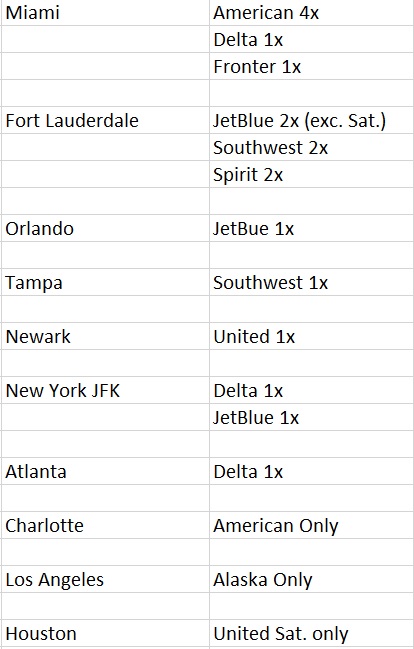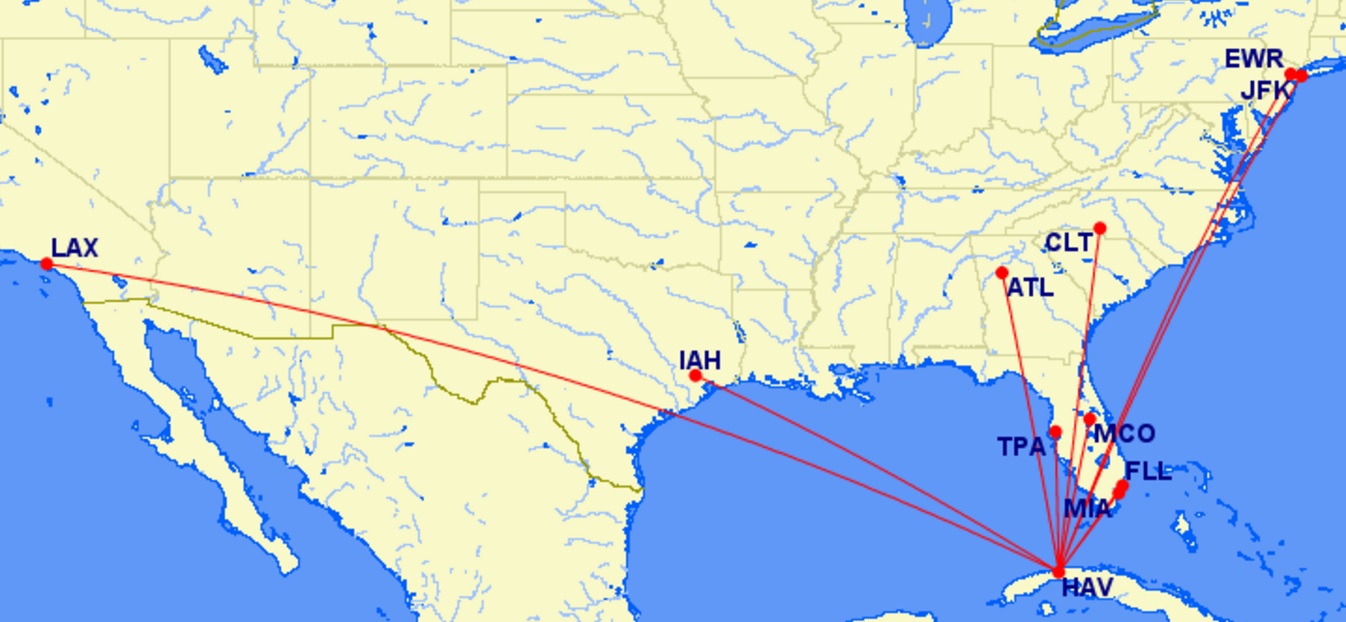The US gets to offer 20 daily flights to Havana, and 10 daily flights to each of Cuba’s 9 other international airports. There weren’t very many requests to fly to other cities, so all of those were granted as-requested last month.
Who Gets to Fly to Havana
American carriers submitted their requests to the Department of Transportation for Havana flights and there were requests for nearly 60. DOT had the task of divvying out 20 flights.
Here’s what the DOT decided upon by airline:

Here’s service by city:

And here’s what the US – Havana route map will look like:

These Awards Mostly Make Sense
Overall I think DOT did a fairly good job making tough choices. The biggest surprise to three readers I emailed with was that there’s no Havana – Washington DC service.
United asked for Saturday non-stop service from Houston, Chicago, and Dulles. They got Houston. Dulles makes sense capital-to-capital but not as Saturday-only leisure service. DOT is right here, despite United making the “capital-to-capital” argument in its filing, implicitly arguing that Miami, Charlotte, and Atlanta connections will be better for flights between Havana and DC.
And of course charter flights, which are still permitted but take the biggest hit from the introduction of scheduled commercial service, can fill in gaps.

Fishing on the Malecón in Havana
I’m somewhat surprised to see Delta get Miami service but not the Orlando service they asked for — this is meant to ensure competition against American in the market (beyond what’s provided by highly competitive Fort Lauderdale service).
American Airlines of course was never going to get close to its requested service. They asked for more than 12 of the 20 daily allowable flights including 10 from Miami. I do think their Dallas Fort-Worth proposal for daily service warranted consideration for better connectivity to the Central and Western United States — and would have been more valuable than the sixth flight awarded to Fort Lauderdale.
American wanted only once-weekly service to Chicago and Los Angeles, and didn’t get Los Angeles so that DOT could give that service to Alaska which plans to operate it daily.
US airlines seem way too excited about Cuba service relative to the opportunity. It may be scarcity of slots, and a drive to keep other airlines from having them, that’s behind much of the feeding frenzy. It’s like the Argentine saying, “Tengo una remera del Che y no sé por qué,” or “I have a Che T-shirt and I don’t know why.”
The US-Cuba business travel market remains pretty limited. There’s the potential for catchup growth if the Cuban government allows it. However,
- Pretty much all traffic for these flights will originate in the US. There’s almost no customer base to support these flights in Cuba.
- Planes will be filled predominantly with leisure travel.
- Infrastructure in Cuba, from the airport to hotels, is wholly inadequate to match an aviation boom and influx of tourists.
- Havana is an expensive airport to operate at, with costs that make Miami look like Branson, Missouri.
It will be interesting to see how the awarded service performs to say the least.
How DOT Decides
Here’s how DOT explains in their press release the methodology they used in selecting which airlines get to fly from which cities.
The Department’s principal objective in making its proposed selections was to maximize public benefits, including choosing airlines that offered and could maintain the best ongoing service between the U.S. and Havana.
…DOT’s proposal allocates nonstop Havana service to areas of substantial Cuban-American population, as well as to important aviation hub cities.
The Department’s process of selecting carriers offers an opportunity to present the public with a wide array of travel choices in the type of airline (network, low-cost, ultra-low-cost); choices of airport; and choices of non-stop or connecting service. The DOT’s proposed selections would simultaneously address service needs while promoting competition.
These decisions are tentative (DOT FAQ, .pdf) — so any airline trumpeting its new Havana routes doesn’t actually have them yet. They will probably get them, but the process still outstanding is:
In contested carrier selection cases DOT routinely makes a tentative decision via a show cause order. This accords due process by allowing interested parties to comment on DOT’s proposed actions before they are made final. Objections to DOT’s tentative decision are due by July 22. If objections are filed, answers to objections will be due July 29. DOT expects to reach a final decision later this
summer.
Not every airline gets what it wants here. Not every airline that gets to serve Cuba (like Silver Airways) gets to serve Havana.
DOT’s Missed Opportunity — They’re Thinking About Public Benefit the Wrong Way
I think DOT is missing an opportunity, though, in the way it analyzes consumer benefit. It’s not just Cuba routes where this comes into play. The DOT awards route authorities to Tokyo Haneda, for instance.
In choosing “airlines that offered” Cuba service, they privilege legacy carriers. With a goal of ensuring routes go to “network” airlines and “connecting service” they privilege existing airlines with large route networks.
Those have consumer benefits, but they’re thinking about the concept too narrowly. If they want to ensure public benefit, it isn’t necessary for a single airline to operate connecting service. That belief is an artifact of consumer-unfriendly policies pursued by the network carriers themselves.
In similar proceedings in advance, or in a dispute over these awards, DOT could clearly state that an airline which interlines broadly has an advantage of airlines that do not because they provide greater consumer choice in connections. Similarly, airlines which allow through-checked baggage on separate tickets with other airlines make it easier for consumers to connect as well.
Airlines which don’t interline (American and Delta no longer interline with each other) and which do not as a matter of policy offer through-checked baggage on separate tickets (which is now the bulk of US carriers) make route awards less useful to consumers.
An airline wishing to demonstrate that it maximizes public benefit for a route case would thus be advised to adopt policies which make it easier for consumers to use those services as part of a broader array of travel choices.
US airlines stopped allowing interlining of checked bags when flying on separate tickets (except, generally, when traveling on the same airline on both tickets or on alliance partner airlines) in response to a DOT rule meant to be consumer-friendly requiring that passengers pay a single checked bag fee for their journey.
Since airlines would have to split bag fees if they through-checked bags, but could each collect bag fees if they provided customers with less service and a requirement to collect and recheck bags, United, Delta, and American have taken the less consumer-friendly stance. Low cost carriers don’t generally interline bags at all.


The big mistake is that Miami is going to be 90% of the local market and gets only 60% of the capacity.
Airlines also prioritize their applications. Delta specifically asked for Miami-Havana before Orlando-Havana, so why is that a surprise?
Gary,
You calling the Havana infrastructure “wholly inadequate” is a huge compliment. It’s not simply inadequate, it has issues with handling current level of travelers. Huge lines everywhere, no direct public transportation option out of the airport and overall sorry state of the infrastructure will result in a really big disappointment. I think the overall experience will be similar to what’s happening right now in Crimea: there were many tourists who came there last year, they saw the level of service and this year decided to go to more tourist-friendly destinations like Turkey.
I believe the same will happen with Cuba: huge influx of curios tourists, followed with major disappointment and abandonment. Mark my words )))
what type of aircraft do you see the airlines using?
@Simon because DOT also awarded Miami to Frontier and because the DOT is clearly not simply giving what the airlines what they want here
Agree, the elimination of interline is absurd. All this infrastructure and you can’t even pay for it if you want it. Worst possible outcome.
Why don’t you take your “thought leadership” to the USDOT? Are you bitter they didn’t ask you to sit on a panel of experts?
Many of your “foregone conclusion” and “near certainty” predictions haven’t exactly panned out.
@Josh G — I file comments with federal agencies where I find it useful to do so, for instance I submitted a regulatory comment on the DOT’s proposed airfare transparency rulemaking in fall 2014 and last year I submitted a comment when the docket opened on the United/Delta/American complaint against Emirates/Etihad/Qatar. I was contacted about attending a DOT frequent flyer advisory committee meeting last year but was unable to attend.
Most of my commentary, of course, I share here on my blog.
Doesn’t it make sense to have at least one Chicago flight? It is the 3rd largest US city.
I agree with everything except the charilette and Atlanta.
Both are fortress hubs and therefore they will abuse being the only ones out of there
They should have skipped the CLT slot and awarded another slot to a competing airline at Atlanta